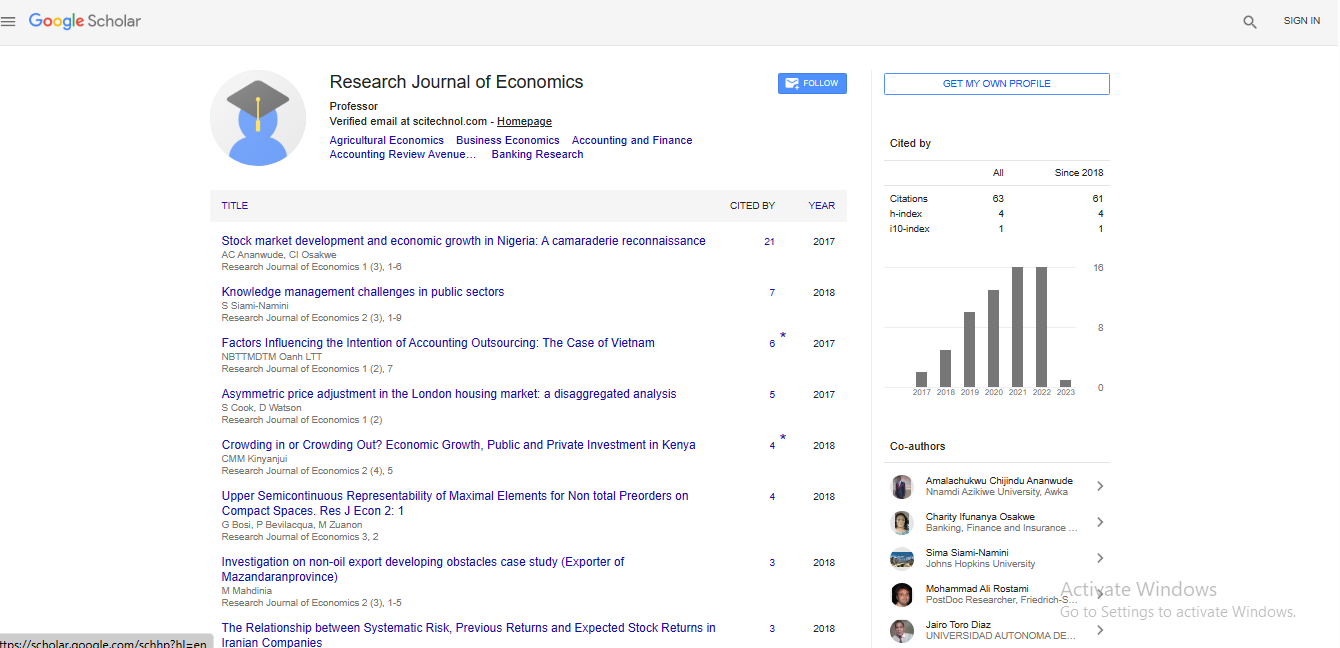Commentary, Res J Econ Vol: 7 Issue: 4
Outcomes of Digital Transformation Initiatives in Contemporary Logistics Management
Omran Mensah*
1School of Mechanical Engineering, National Technical University of Athens, Athens, Greece
*Corresponding Author: Omran Mensah,
School of Mechanical Engineering,
National Technical University of Athens, Athens, Greece
E-mail: omranm@mail.ntua.gr
Received date: 28 June, 2023, Manuscript No. RJE-23-113053;
Editor assigned date: 30 June, 2023, PreQC No. RJE-23-113053 (PQ);
Reviewed date: 14 July, 2023, QC No. RJE-23-113053;
Revised date: 21 July, 2023, Manuscript No. RJE-23-113053 (R);
Published date: 28 July, 2023, DOI: 10.4172/RJE.1000156
Citation: Mensah O (2023) Outcomes of Digital Transformation Initiatives in Contemporary Logistics Management. Res J Econ 7:4.
Description
Logistics management is a critical component of modern supply chains, encompassing the planning, execution, and control of the movement and storage of goods and services. Efficient logistics management is essential for businesses to meet customer demands, control costs, and reduce environmental impact. It involves coordinating various activities, from procurement to distribution, to ensure seamless operations and optimal resource utilization. Digital transformation has revolutionized logistics management, reshaping supply chain operations through the integration of advanced technologies and data-driven solutions.
Digital transformation is reshaping traditional logistics management, enabling businesses to gain a competitive edge by harnessing the power of technology to optimize processes, improve customer experiences, and achieve supply chain resilience. Effective logistics management requires collaboration among suppliers, manufacturers, distributors, and retailers to streamline processes and minimize delays. Balancing inventory levels is crucial to avoid stock outs while preventing excess inventory that ties up capital and storage space. Efficient transportation routes, modes, and scheduling contribute to timely deliveries and cost savings. Strategies like route optimization and load consolidation improve efficiency.
Challenges and strategies in logistics management
International trade and complex supply chains introduce challenges such as customs regulations, varying infrastructure, and cultural differences. Fluctuations in consumer demand lead to the bullwhip effect, causing supply chain inefficiencies and excess inventory. Logistics activities contribute to carbon emissions and environmental degradation. Balancing economic interests with sustainable practices is a significant challenge.
The integration of technologies like IoT, RFID, and block chain enhances real-time tracking, visibility, and traceability in the supply chain. Implementing lean principles, such as minimizing waste and optimizing processes, improves efficiency and reduces costs.
Embracing green logistics practices, like using eco-friendly packaging and optimizing transport routes, reduces carbon emissions and supports sustainability. Developing contingency plans and strategies to mitigate disruptions caused by natural disasters, geopolitical events, or supplier failures is essential for supply chain resilience. Diversifying suppliers, manufacturing locations, and transportation routes reduces dependency on single sources and enhances resilience.
Data analytics and technology
Utilizing data analytics helps predict demand patterns, enabling proactive decision-making and preventing inventory imbalances. Utilizing historical and real-time data, predictive analytics forecasts demand fluctuations, helping businesses optimize inventory levels and prevent stock outs or overstocking. Prescriptive analytics recommends optimal actions to achieve desired outcomes, aiding in decisionmaking for route planning, inventory management, and resource allocation. Data-driven visibility allows stakeholders to monitor shipments, track inventory, and identify potential bottlenecks in real time, leading to faster response times.
IoT devices and sensors collect real-time data from shipments, vehicles, and facilities, providing insights into location, temperature, humidity, and other critical parameters. AI-driven algorithms analyze data patterns to forecast demand, optimize routes, and automate decision-making for efficient logistics operations. Block chain enhances transparency and traceability in supply chains by creating an immutable record of transactions and movements, reducing the risk of fraud and ensuring product authenticity. Real-time tracking of shipments empowers customers with accurate delivery information, improving satisfaction and building trust. Data analytics enable personalized customer experiences by analyzing preferences, purchasing behavior, and feedback, leading to tailored services. AIpowered route optimization algorithms consider factors like traffic, weather, and delivery windows, reducing transportation costs and delivery times. Robotic process automation and autonomous vehicles streamline warehouse operations, reducing labor costs and improving accuracy.
Conclusion
Logistics management is a pivotal discipline that drives the efficiency, sustainability, and competitiveness of supply chains. By embracing technological advancements, implementing sustainable practices, and fostering supply chain resilience, businesses can navigate the challenges of today's dynamic global markets while contributing to a more sustainable future. Collaboration among stakeholders, continuous innovation, and a commitment to responsible logistics are essential for achieving success in this critical field. Digital transformation is reshaping logistics management, offering unprecedented opportunities to optimize supply chain operations, enhance customer experiences, and achieve greater sustainability and resilience. By embracing IoT, AI, block chain, and data analytics, businesses can navigate the complexities of modern supply chains and adapt to the ever-changing demands of global markets. The journey toward digital transformation requires strategic planning, investments in technology, and a commitment to fostering innovation throughout the logistics ecosystem.
 Spanish
Spanish  Chinese
Chinese  Russian
Russian  German
German  French
French  Japanese
Japanese  Portuguese
Portuguese  Hindi
Hindi 